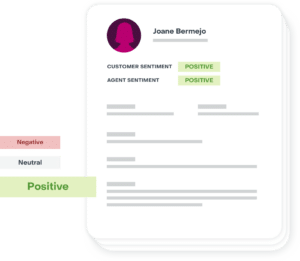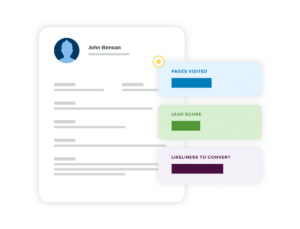How Will AI Change the Future of Sales and Marketing?
Artificial intelligence (AI) has come a long way since buttons and formulas on an oversized computer. Today, AI is responsible for everything from smart assistants to manufacturing to self-driving cars—and sales and marketing have been early adopters. Today, companies use AI to predict customer behavior, serve more people, better target campaigns, forecast trends, etc.
How will AI change the future of sales and marketing? It already does.
AI in Sales and Marketing Today
AI is an umbrella term for any machine intelligence that mimics human intelligence. We see this in several AI-driven applications across industries today:
- Smart assistants (e.g., Amazon Alexa, Apple Siri, GPS assistants)
- Product recommendations (e.g., Netflix suggestions, Amazon recommendations)
- Self-driving cars (e.g., Tesla)
- Manufacturing robots
- Automated customer support
- Personalized health guidance
AI has also made big waves in sales and marketing, especially in the past 10 years. In the last four years alone, the number of businesses adopting AI grew by 270%. Enterprises seem to acknowledge the most significant opportunities for AI as the largest adopters among all types of companies, particularly in sales and marketing.
AI in Sales
AI saves teams tremendous time by identifying more direct routes to guaranteed sales. Already, sales professionals have started reaping the benefits by adopting AI-powered:
- Sales forecasting. Instead of blindly selling, AI monitors trends and predicts outcomes to help sales set goals and plan accordingly.
- Lead capture and support. AI chatbots open up the possibility of 24/7 lead capture by “conversing” with interested parties even when inbound teams are unavailable. AI bots also help customer service offer around-the-clock support with automated responses based on keywords a customer uses.
- Lead scoring. Instead of using gut instinct, sales can prioritize the leads that AI tools deem most worthy of attention based on prospect actions and past deal performance, driving conversion and ROI.
- Recommended actions. When sales doesn’t know where to turn next, sales AI can point them to the next best action, help decide which deals to prioritize and recommend cross-sell or up-sell opportunities.
- Automation and productivity. AI tools also remove some of the day-to-day tasks from sales’ workload (like data management or routing agreements for approval), giving them more time to focus on deal strategy and building customer relationships. Sixty-one percent of employees even say efficiency and productivity is AI’s biggest benefit.
- Competitive intelligence. Some AI assistants reduce sales reps’ work by crawling the web for competitive intelligence, monitoring competitor activity across hundreds of sources around the internet.
AI in Marketing
- Personalized campaigns and web experiences. AI uses past consumer behavior to identify customers, track their preferences, and create more targeted, personalized marketing to continually engage them.
- Product recommendations. Product recommendations are among the most common uses of AI in marketing, acting on shopper behavioral data to suggest other products that might also interest them.
- PPC advertising. AI marketing tools can help uncover new advertising avenues instead of relying on humans to search and gather information continually.
- Content creation and curation. Natural language processors and generators have come a long way, making it possible to outsource written content like recaps and summaries. AI also helps marketers take the guesswork out of curating libraries or assembling content bundles for subscriber consumption.
AI in Sales and Marketing of the Future
Even in its relative infancy, AI has already proven its worth in helping organizations drive efficiency and profitability. Yet, only a small percentage of companies own AI solutions—and even fewer use them regularly. But with such tremendous potential, AI is set to contribute $15.7 trillion to the global economy by 2030.
Already, new and innovative uses are emerging across both sales and marketing in areas such as:
- Facial recognition. Retail brands take search engine image identification further by implementing facial recognition software in stores. When the AI recognizes a shopper as a previous customer, it can better target them with offers based on their past behavior.
- Advanced content creation. AI-powered content creation is getting good enough to generate larger pieces like whitepapers and press releases that sound like human language, saving marketers time and money.
- Voice-enabled applications. As voice assistants mature and reach market saturation, it creates an opportunity for marketers to use them in marketing strategy with voice-related ads and brand-related content the assistant can reference.
- Sales compliance. Instead of risking human error, AI can handle the complex challenges of managing compliance to mitigate risk across the value chain.
- Augmented reality (AR). No longer just for gamers, AR technology gives brands another place to connect with consumers either through ads or apps that help them visualize products in their homes.
Increased AI applications across sales and marketing don’t mean lost jobs either. It means enhancing jobs with smarter data that employees can then act on. It means less grunt work and more people work. And it ultimately means better customer experiences that anticipate and meet more people’s needs.
SugarCRM and the Future of AI
AI is changing the future of sales and marketing before our eyes. As AI becomes more advanced across every facet of our lives, sales and marketing need solutions that can better meet consumer expectations while helping them boost productivity and increase profitability.
SugarPredict helps small and mid-sized businesses provide a high-definition customer experience (HD-CX). It uses artificial intelligence to predict the likelihood of conversion, forecasts future trends with relevant data, streamlines workflows to boost productivity, avoid past mistakes, potential threats, etc.
Experience the power of artificial intelligence for yourself by requesting a demo today.



